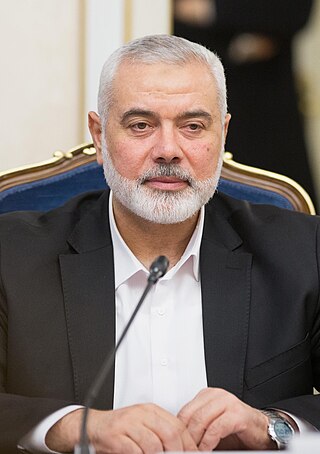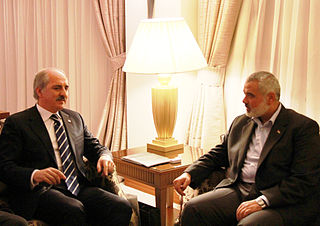
Jerusalem is a city in the Southern Levant, on a plateau in the Judaean Mountains between the Mediterranean and the Dead Sea. It is one of the oldest cities in the world, and is considered holy to the three major Abrahamic religions—Judaism, Christianity, and Islam. Both the State of Israel and Palestine claim Jerusalem as their capital. Israel maintains its primary governmental institutions there, and Palestine ultimately foresees it as its seat of power. Neither claim is widely recognized internationally.

The Organisation of Islamic Cooperation, formerly the Organisation of the Islamic Conference, is an intergovernmental organization founded in 1969, consisting of 57 member states, with 48 being Muslim-majority countries. The organisation states that it is "the collective voice of the Muslim world" and works to "safeguard and protect the interests of the Muslim world in the spirit of promoting international peace and harmony".

Palestine, officially the State of Palestine, is a country in the Southern Levant region of West Asia. It comprises of two disconnected regions – the West Bank and the Gaza Strip. It shares borders with Israel to the west and north, Jordan to the east and Egypt to the southwest. Palestine's combined land area is 6,020 square kilometres (2,320 sq mi) while its population exceeds five million people. Its proclaimed capital is Jerusalem while Rafah is the largest city and Ramallah serves as the administrative center. The official language is Arabic. The majority of Palestinians practice Islam while Christianity also has a significant presence.

East Jerusalem is the sector of Jerusalem that was held by Jordan after the 1948 Arab–Israeli War, as opposed to the western sector of the city, West Jerusalem, which was held by Israel. Under international law, East Jerusalem is considered a part of the West Bank and, therefore, of the Palestinian territories. A number of states recognize East Jerusalem as the capital of the State of Palestine, whereas other states assert that East Jerusalem "will be the capital of Palestine", while referring to it as "an occupied territory".

The status of Jerusalem has been described as "one of the most intractable issues in the Israeli–Palestinian conflict" due to the long-running territorial dispute between Israel and the Palestinians, both of which claim it as their capital city. Part of this issue of sovereignty is tied to concerns over access to holy sites in the Abrahamic religions; the current religious environment in Jerusalem is upheld by the "Status Quo" of the former Ottoman Empire. As the Israeli–Palestinian peace process has primarily navigated the option of a two-state solution, one of the largest points of contention has been East Jerusalem, which was part of the Jordanian-annexed West Bank until the beginning of the Israeli occupation in 1967.

The Islamic Republic of Iran officially recognises Palestine as a state. Ali Khamenei, the Supreme Leader of Iran, rejects a two-state solution and implies that Palestine is inseparable, while Iran's former President Mahmoud Ahmadinejad called for a free referendum for the entire Palestinian population, including Arab citizens of Israel, to determine the type of government in the future Palestinian State, while reiterating that establishment of a Palestinian State alongside Israel would "never mean an endorsement of the Israeli occupation".

The State of Israel and the Republic of Turkey formally established diplomatic relations in March 1949. Less than a year after the Israeli Declaration of Independence, Turkey recognized Israeli sovereignty, making it the world's first Muslim-majority country to do so. Both countries gave high priority to bilateral cooperation in the areas of diplomacy and military/strategic ties, while sharing concerns with respect to the regional instabilities in the Middle East. In recent decades, particularly under Turkey's Erdoğan administration, the two countries' relationship with each other has deteriorated considerably. However, diplomatic ties were reinstated after a successful normalization initiative in mid-2022.

The following outline is provided as an overview of and topical guide to the State of Palestine:

Saudi Arabia and Turkey relations have long fluctuated between cooperation and alliance to enmity and distrust. Since the 19th century, the two nations have always had a complicated relationship. While Turkey and Saudi Arabia are major economic partners, the two have a tense political relationship, deemed from the historic enmity.

The foreign policy of the Recep Tayyip Erdoğan government concerns the policy initiatives made by Turkey towards other states under Prime Minister, Recep Tayyip Erdoğan.

The Palestinian–Serbian relations are bilateral relations between the State of Palestine and the Republic of Serbia. Relations between Serbia and Palestine have been very close and friendly.

Ismail Haniyeh is a Palestinian politician who is seen as the overall political leader of Hamas, the de facto ruling entity of the Gaza Strip. He is the current chairman of Hamas’s political bureau; as of 2023, Haniyeh lives in Qatar.

Quds Day, officially known as International Quds Day, is an annual pro-Palestinian event held on the last Friday of the Islamic holy month of Ramadan to express support for Palestinians and oppose Israel and Zionism. It takes its name from the Arabic name for Jerusalem: al-Quds.

On December 6, 2017, the United States of America officially recognized Jerusalem as the capital city of the State of Israel. American president Donald Trump, who signed the presidential proclamation, also ordered the relocation of the American diplomatic mission to Jerusalem from Tel Aviv, constituting what is now the Embassy of the United States in Jerusalem, which was established on the grounds of the former Consulate General of the United States in Jerusalem. Israeli prime minister Benjamin Netanyahu welcomed the decision and praised the announcement by the Trump administration. On December 8, U.S. Secretary of State Rex Tillerson clarified that Trump's statement "did not indicate any final status for Jerusalem" and "was very clear that the final status, including the borders, would be left to the two parties to negotiate and decide" in reference to the recognition's impact on the Israeli–Palestinian peace process.

United Nations General Assembly Resolution ES‑10/19 is an emergency session resolution declaring the status of Jerusalem as Israel's capital as "null and void". It was adopted by the 37th Plenary meeting of the tenth emergency special session of the United Nations General Assembly during the tenure of the seventy-second session of the United Nations General Assembly on 21 December 2017. The resolution was drafted by Yemen and Turkey. Though strongly contested by the United States, it passed by 128 votes to 9 against with 21 absentees and 35 abstentions.

The Bahrain–Israel normalization agreement, officially Abraham Accords: Declaration of Peace, Cooperation, and Constructive Diplomatic and Friendly Relations, is an agreement to normalize diplomatic and other relations between Bahrain and Israel. The agreement was announced by President Donald Trump on September 11, 2020, and followed on from a joint statement, officially referred to as the Abraham Accords, by the United States, Israel and the United Arab Emirates (UAE) on August 13, 2020. It was formally signed on September 15, 2020, at the White House in Washington, D.C., and made Bahrain the fourth Arab state to recognize Israel and the second within a month.

Al-Quds Committee, also known by its affiliated arm name adopted in 1995, Bayt Mal Al Quds Agency, is an intergovernmental organization and one of the four standing committees of the Organisation of Islamic Cooperation established in July 1975. It is focused on cultural, political, social, religious and human rights issues in Jerusalem caused by the Israeli–Palestinian conflict. Its principles are predominantly focused on the protection of Al-Aqsa, and cultural heritage of the city in addition to serving as an advocacy agency specialized in humanitarian and social works, concerning health, education housing children's as well as women's rights.

As part of Turkey's objective to play a mediating role in the region, the country tries to be on speaking terms with both Israel and Hamas. From time to time, Israel has suggested Turkey to support Hamas, while in other cases it has opposed the support.
The Seventh Extraordinary Session of the Islamic Summit Conference was an event organized by the Organization of Islamic Cooperation (OIC) on 18 May 2018 in Istanbul, Turkey. The conference was organized in response to the serious developments in the State of Palestine.















